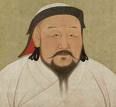

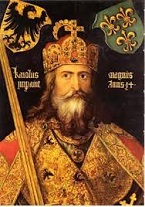


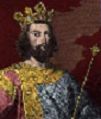
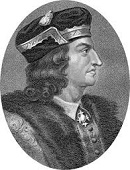
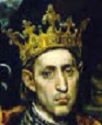










A Quick History of the Monarchs of France |
© Copyright by T.L. Winslow. All Rights Reserved. |
Original Pub. Date: Oct. 7, 2007. Last Update: Oct. 30, 2022. |









French monarchs are nowhere near as important as English kings to a historyscoper. First, they were mainly either whimps with no power, or mad victims of inbreeding. And let's face it, until near the end of the Hundred Years' War in 1453, the Norman kings of England owned the Frogs, so only a few great French kings arose over the long centuries, although they usually enjoyed long reigns and dominated their eras, indeed, maybe reigned too long, and became too absolute, bringing on the inevitable French Revolution of 1789. So, after laying the English monarchs down in your mind like mac and cheese, sprinkle these on top like bread crumbs and bake it in your oven with the appropriate French spices.

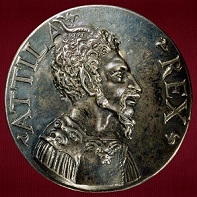
Quick summary:
France traces its origin to Clovis I (466-511), who founded the Merovingian Dynasty in 496 by converting to Roman Catholicism from paganism.
Before that France was called Gaul, home of the Celtic tribes conquered by Caesar back in -58 to -53, which was turned into a Roman province for centuries, until the pesky German Visigoths sacked
Rome in 410 then moved into Gaul and stayed, after which by 419 they were grudgingly accepted as equals and citizens of the empire, more than proving it later by helping the Romans expel horrible
Wild Thing You Make My Heart Sing Attila (Gothic for "little father"?) the Hun (the Mundzuk) (406-53) and his hordes of horsemen in 451.
Indeed, Attila so weakened the Italians that the Visigoths decided they were more than equal to them, and closed in and smothered the Roman Empire out of existence by 476,
leaving Gaul in the hands of a Visigoth king, with another ruling Italy, and another ruling North Africa.
Not that the Visigoths were pagan. They were Christian Arian, which to the papal establishment in Rome meant heretic.
Hence, when Clovis I converted to "true" Athanasian Christianity, the pope backed him in systematically kicking the Visigoths out of Gaul with the help of a fifth column of Athanasian Latins, which
he did in 507, creating the land of the Franks, i.e., France, and forming a long-lasting bond where the pope could call on the Franks to kick Visigoth or other brands of German butt anytime he needed,
which is where the French sense of cultural superiority got its start, even though they were German too, but through the papal crackalackin' mamba jamba got laundered into a new type of cat, which t
he English later called the Frogs, and got another twist from the remaining Celtic element in France, which messed up their ja ja ja German language and helped turn it
into oui oui oui French (along with the Latin remnant).
Actually, Clovis is a Latinized version of his real name Clodwig or Ludwig, and after being Frenchified we get Louis (pronounced LOO-EE),
which explains why so many French kings were named King Louis, which are formally numbered up to XX, not counting Louis-Philippe, although
some never ruled. The Merovingians were very tolerant towards the Jews, despite pressure by the Roman Catholic Church, making some claim that they believed that they were of the Jewish House of David
and hence entitled to be kings of the Jews; Merovingian kings never cut their hair, like Samson the Nazorite, and probably Jesus Christ and his brother St. James, and ruled as mystical priest-kings who
were above mere govt. affairs, leaving that to the mayors of the palace, who later overthrew them, getting away with practicing polygamy even after converting to Roman Catholicism.

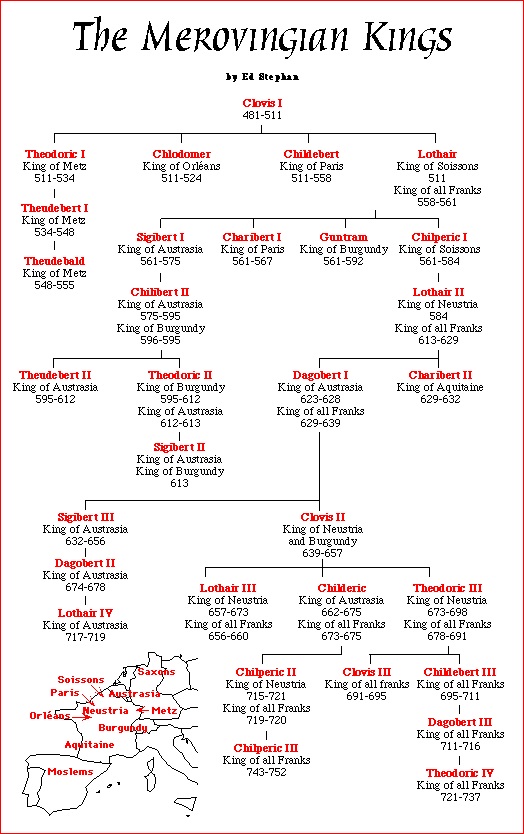
In 481 C.E. Childeric I (b. 437) died, and 15-y.-o. son Clovis I (466-511) became king of the Germanic Salian (still pagan) Franks (later, first Merovingian king of all the Franks) at Tournai on the right bank of the Rhine River; all Merovingian priest-kings are known for their blue Germanic eyes, wearing long hair a la Samson and claiming magic powers via Noah and ancient Arcadia and Troy, automatically b ecoming priest-king at age 12 and leaving govt. admin. to the mayors of the palace (who overthrow them in 751), while they continue to practice polygamy even after converting to Roman Catholicism; in 1653 Childeric I's tomb is discovered, containing 300 miniature gold bees, a severed horse's head, a golden bull's head, and a crystal ball; in 1804 Napoleon has the bees affixed to his coronation robes.

In 511 Clovis I died, leaving four sons, who proceeded to split his kingdom up like a casino, with Theodoric (Theuderic) (Thierry) I (484-534) getting Metz, Rheims, and Austrasia (NE France), Chlodomer (495-524) getting Orleans, Childebert I (497-558) getting Paris, and Chlotar (Clotaire) (the Old) I (497-561) getting Soissons. Ever after, France was plagued by lack of unity, and even when a monarch succeeded in uniting it, the heirs of the other former mini-kings, now calling themselves dukes (an old Roman title), rocked the house like John Goodman as King Ralph and combined to keep the king couped up on the tiny tracks-of-my-tears Ile de Paris.

In 632 Arab madass warlord prophet Muhammad (570-632) died after creating a new monotheistic religion crossing Judaism, Christianity, and uniquely Arab Allah (Moon god?) worship and ethnically cleansing the Arabian Peninsula, after which his followers launched a takeover attempt of the whole world, starting with Persia, Syria, Egypt, and the Holy Land, which they conquered by 642. The Muslim conquest of Europe sputtered in 732 when they were thrown out of France by Christian hero Charles Martel the Hammer (686-741), grandfather of Charlemagne (742-814). Let's back up and cover that in more detail.
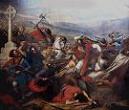
On Oct. 10, 732 Charles Martel "the Hammer" (686-741) became the greatest hero in French history when he stopped the Muslim Moor takeover of France at the Battle of Tours-Poitier, although it was too late to do anything about their takeover of Spain from the Visigoths in 711, and it took until 1491 for Catholics Kings Ferdinand and Isabella to finally expel the last of them.
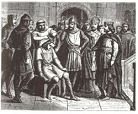
In 743 Pepin III the Short and Carloman finally recognized Childeric III (717-54) (son of Chilperic II?) as Merovingian king of all the Franks (until 751), becoming the last; when Pope Gregory III later sought his help against the Lombards, he bestowed on him the title of "Most Christian", which French kings used ever afterwards.



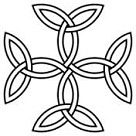
In 751 Charles Martel's son Pepin III the Short (714-68), mayor of the palace of Paris got Pope Zachary to agree to let him dethrone the whimpy Merovingian king (since 743) Childeric III, and he was elected the new king of the short, er, Franks (first Carolingian king) at a gathering of Frankish nobles in the Merovingian capital of Soissons, and anointed and crowned at the Abbey of St. Medard, officially deposing Childeric, who is packed off to to the Monastery of Saint-Bertin next year with his son Theuderic (Saint-Omer and Saint-Wandrille?); for the first time bishops attend with a rank equal to secular nobles; annointing with oil superseded the right of blood descent?; he founded his own Carolingian (Carlovingian) Dynasty (House of Pepin) (ends 987), with the remnants of the Merovingians going underground and plotting a comeback (until ?); it has its own Carolingian Cross. Pepin III the Short's giant 7-foot son Charlemagne (742-814) spent his life not only fighting the pesky Muslims in Spain but crushing the remaining pagans in Saxony, Frisia (Netherlands) and Norseland, adopting the Muslim tactic of forced conversion, and building an empire in western and central Europe, for which Pope Leo III crowned him the first Holy Roman Emperor (HRE) on Christmas Day of 800. Too bad, his Sword and Cross technique backfired when the riled-up Norse take to their long ships and become pagan pirate Vikings, terrorizing the Christian coasts at will, and go on to make it their lifestyle for centuries, which caused France and the rest of Europe to go into a defensive under-siege mode called feudalism, see any Road Warrior movie, how many arrests in twenty years, zero point six? Honorable mention should be given to Charlemagne's nephew Roland (-778), who became the subject of endless hero stories.

In 781 Charlemagne's son Louis (Ludwig) I (the Pious) (the Fair) (the Debonaire) (778-840) became king of Aquitaine, followed in 813 by HRE, and in 814 by king of the Franks. Too bad, under the weight of Viking raids the Holy Roman Empire became kaput by 924, and when it was finally revived in 962 it was German king Otto I the Great who did it, showing how the wheel had turned in 500 years.
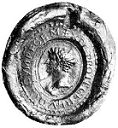
In 817 Louis I the Pious' 3rd son Louis II the German (806-76) became king of Bavaria, followed in 843 by the first king of East Francia, which was called Germania by the Romans. Until then the Franks were all probably speaking a mix of fractured Latin and German, but now French began its split from German, if you think Washington is a mess I'm asking you for your vote.
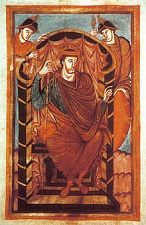

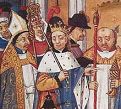
On May 5, 840 as Charlemagne's son HRE Louis I the Pious (b. 778) was returning from battle he saw an eclipse, frightening the superstitious dude to death, and he fell ill on an island in the Rhine near Ingelheim and died on June 20; he was succeeded by his eldest son (by Ermengarde of Hesbaye) Lothair (Lothar) (Lothaire) I (795-855), whose brothers Pepin II (797-838) of Aquitaine and Louis II the German (806-75) of East Francia, and half-brother (by Judith of Bavaria) Charles II the Bald (Chauve) (823-77) of West Francia started a civil war over succession that lasted until 843 and ended up splitting Charlemagne's Frankish kingdom into three smaller franks (the future France, Germany, and Low Countries, with Burgundy acting as a sauce?); in the first inning, Charles II the Bald and Louis II the German allied against him. To summarize, Charles II the Bald outlasted him, and in 875 became HRE, and in 877 his sickly son Louis II the Stammerer (le Begue) (846-79) became king of the West Franks, ruling only two years before croaking.
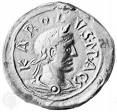
In 881 Louis II the German's youngest son (great-grandson of Charlemagne) Charles III the Fat (839-88) became the last Carolingian to rule over Charlemagne's briefly-reunited empire.

In 888 Odo (Eudes) of Paris (859-98), son of Robert the Strong, Count of Anjou became the first king of the West Franks, founding the Robertian (Robertine) Dynasty.


The biggest thing to come out of Charlemagne's big mistake was the Normans. In spring 911 after a hundred years of Viking terrorist raids on Free-for-All France, Norse Viking chief Rollo (Hrolf) (Rolf) Ragnvaldsson (the Ganger) (the Walker) (Wend-a-Foot) (860-932) (who once explored the E coast of North Am. as far S as Conn.?) sailed down the Seine River with a raiding and settling party, and sieged Chartres, then prepared to ransack gay Paris, until whimpy king of the West Franks (Charles III, you are no Charlemagne?) Charles III the Simple (879-929) (probably hearing that the Vikings can be bought off, like Eli Wallach in the film "The Magnificent Seven", and saying something like, "Rollo, please do not sack gay Paree, just take this box of treasure, and I'll make you a duke and give you my beautiful daughter, the hottest French poontang in the land, and you can move into the bad side of France and have the left bank of the Seine, plus a little of the right bank, where you can have some Lebensraum and act as bouncers for any other Vikings, how about it, guy"?) copped out, and in the fall signed the Piece, er, Treaty of Saint-Clair-sur-Epte (Fr. "sint clair" = "clear well or pool"), granting them land on the left bank of the Seine River (the bad side of France?), with Rouen (on the right bank) (named after him, which is convenient, because it was originally the Gallic city of Ratumacos) as their new capital, on the condition that they defend the land, receive Christian baptism, and do homage to Charles as their overlord; Charles also sweetened the pot by giving Rollo his daughter (sister?) (all made up?) Gisela of France in marriage to cement the deal; when Rollo's proxy went to perform the rite of allegiance by kissing the king's foot, the rude Viking stood erect, lifted the royal foot to his mouth and toppled Charles over backward, causing Rollo's men to have a good laugh?; Rollo founded the French duchy of Normandy (Northmen Duchy - get it?), becoming duke #1 (until 927), and was baptized under the name Robert, becoming Duke Robert I; the Norsemen acquired the French language and culture (which they proceeded to inject with Norse words and turn into their own dialect), learned to ride horses, built forts and siege machinery, and continued their raids on Brittany; Charles III's act was so unpopular with his barons that they started calling him Charles the Simple, and later deposed and imprisoned him for it. Too bad, after they converted to orthodox Roman Catholic Christanity to keep their side of the bargain, the French taught these newly-PC sea pirates the art of horsemanship, creating the phenomenon of the Norman knights, who became mercenaries and adventurers all over Europe and the Middle East, eventually seizing Sicily (1060-90) and even sacking Rome once (1084), 16 years after taking England from the formerly German Anglo-Saxons, who moved in after the Romans left in the 400s and 500s and pushed the remaining aboriginal Celts back to their usual hiding places in the north and west parts of the British Isles.
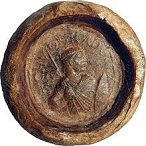
On Sept. 20/24, 911 Louis III the Child (b. 893) died, ending the East Frankish line of the Carolingians; on Nov. 10 to avoid accepting a West Frankish ruler, the German magnates elected Conrad I (890-918), duke of Franconia, who became the first elected king of the dying Carolingian Empire (until Dec. 23, 918), fighting Magyar raids and ducal rebellions in Saxony, Bavaria, and Swabia.
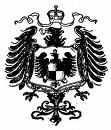 On May 24, 919 Saxon duke (since Nov 30, 912) Henry the Fowler (876-936)
of Saxony was elected king Henry I of East Francia, becoming its first non-Frankish king, founding the
Saxon (Ottonian) Dynasty,
a new line of Saxon emperors (ends 1024); he was called the Fowler because the messengers announcing his election find him hawking;
cool to the Church, he avoided coronation by ecclesiastics; by his wife Matilda he fathered three sons,
Otto I (the Great) (912-73),
Duke Henry I of Bavaria (919-55),
and Archbishop (St.) Bruno I the Great of Cologne (925-65),
and two daughters, Gerberga (who later marries Louis IV of France), and Hedwig (who later married Duke Hugh the Great and had son
Hugh Capet of France) - the original German couch potato?
On May 24, 919 Saxon duke (since Nov 30, 912) Henry the Fowler (876-936)
of Saxony was elected king Henry I of East Francia, becoming its first non-Frankish king, founding the
Saxon (Ottonian) Dynasty,
a new line of Saxon emperors (ends 1024); he was called the Fowler because the messengers announcing his election find him hawking;
cool to the Church, he avoided coronation by ecclesiastics; by his wife Matilda he fathered three sons,
Otto I (the Great) (912-73),
Duke Henry I of Bavaria (919-55),
and Archbishop (St.) Bruno I the Great of Cologne (925-65),
and two daughters, Gerberga (who later marries Louis IV of France), and Hedwig (who later married Duke Hugh the Great and had son
Hugh Capet of France) - the original German couch potato?

On July 2, 936 king (since May 24, 919) Henry I the Fowler of East Francia died, and his son Otto I (the Great) (912-73) was crowned king of Germany in Aachen by the archbishop of Mainz, his coronation banquet reviving the Carolingian tradition (based on the Roman tradition), with the duke of Franconia serving as ceremonial steward, the duke of Swabia as cupbearer, the duke of Lorraine as chamberlain, and the duke of Bavaria as marshal; he established Quedlinburg in Germany as his seat; beginning of the Ottonian Period in Architecture (ends 1050); Otto began a 3-year war to reduce the duchies of Bavaria, Franconia, Lorraine, and Saxony, and later kept all of them except Saxony in his own hands or those of his family; on Feb. 2, 962 he was crowned HRE (until May 7, 973) - but this is getting off the main track, so we'll return to Frankenberry.




Lucky for France and the rest of Europe, the Muslims split into the warring Shiite and Sunni camps, who started hating each other worse than the Christians, taking the steam out of their formerly relentless plan to conquer the world for Allah. Meanwhile by the end of the 900s the Viking menace began ending as the big voodoo date 1000 scared them into finally converting to Christianity, after which the promised Armageddon and return of Christ failed to materialize, but tough titties, it was too late to go back, since once a child is brought up Christian the Church has their mind for life by age 5, right? (Ditto any religion, unfortunately.) In 987 after new king Louis V (b. 967) died one year after his accession from a hunting accident (or was poisoned by his mother), leaving no heirs, Bishop Adalbert of Reims and Gerbert of Reims engineered the election of Hugh Capet (938-96), who founds the Capetian Dynasty (until 1328), which became known for long-reigning weak kings (other than his measly 9 years), Edward Gibbon writing the famous soundbyte about them: "In this narrow compass [Paris and Orleans] he was possessed of wealth and jurisdiction; but in the rest of France, Hugh [Capet] and his descendants were no more than the feudal lords of about sixty dukes and counts, of independent and hereditary power... whose disregard of their sovereign was revenged by the disobedience of their inferior vassals" - (The Decline and Fall of the Roman Empire, Ch. 58). He was followed by Robert II the Pious (972-1031) (35 years), Henri I (1008-60) (pronounced like "on ree") (29 years), and Philip (Philippe) I the Amorous (1052-1108) (from the Greek word for horse-lover) (48 years).





In 1108 Louis VI the Fat (1081-1137) became the first Capetian king who was popular with the people of France, enjoying a well-fed 29-year reign. His son Louis VII the Young (1120-80) (43 years) was also popular, his first wife (1137) being Eleanor of Aquitaine (1122-1204), who later (1152) married Henry II of England, making Henry a big man in France as well as England in one of the biggest power plays of the 12th cent., starting the 300-year tug-of-war ending with the Hundred Years' War (1337-1453). Philip (Philippe) ("horse lover") II Augustus (1166-1223) (43 years) went on the Third Crusade with his pal Richard I Lionheart of England, then turned into bitter enemies, and Philip got Richard captured on his way back and held for ransom, while Richard's mean bro' John Lackland schemed to stab him in the back, see any Robin Hood flick. After seeing both of Henry II's sons Richard I and John I come to bad ends, and boy king Henry III placed on the English throne, Philip II died as the #1 monarch of Europe. Too bad, his son Louis VIII the Lion (1187-1226) broke the mold and ruined all his work with a short 3-year reign ended abruptly by dysentery contracted during a campaign to burn Albigensian Cathar heretics in Provence (south France).

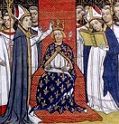
But France's best years are still ahead. In 1226 Louis VIII's lucky son Louis IX the Saint (1214-70) (Louis #9 and Capetian king #9) brought the tradition back with a 44-year reign, giving France its medieval golden age, and getting sainted to boot, so if you're a Francophile you probably wish you could time travel back to the 13th century - no Black Death, no pesky Renaissance or Commies, few Jews, a Christian saint for your king - paradise. After he died on the Eighth Crusade in Tunis (if it had only been #9 too?), Louis IX's son Philip (Philippe) III the Bold (Strong) (1245-85) went retro again to a short (15 year) reign, but at least didn't have any more Crusades to worry about, as the Christians pretty much conceded precious Jerusalem after the short Ninth Crusade of 1272, and the Muslims kept it until the Arab-Israeli Six-Day War of 1967, and even then it took Jews to take it.

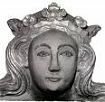

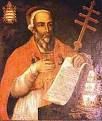
In 1285 Louis IX's son Philip (Philippe) IV the Fair (1268-1314), known for his handsome looks and long blonde hair became king, reigning 29 years, and becoming infamous for ordering the arrest of the by then useless Knights Templar on Friday the 13th of October in 1307 so he could get his hands on their great treasure, but ending up with zilch because they spirited it away somewhere, check back with Dan Brown when you find out. Philip IV's blonde-haired supermodel daughter Isabelle of France (Isabella of England) (1295-1358) married Edward I Longshanks' faggot son Edward II, and hooked up with Mel Gibson, getting preggers with Edward III. Just kidding. They never actually met, so it was obviously Robert the Bruce who knocked her up. Philip IV may have been a male supermodel, but he was into wealth and power, and nothing, not even the papacy was sacred to him, and he got in a war with Pope Boniface VIII (1235-1305) over who's boss, sending hit men to assassinate him in Rome, then moving the papacy to nice and close de-Catharized Avignon in south France in 1309, beginning the Babylonian Captivity (ends 1377). It was actually his French-born puppet Pope Clement V (1264-1314) (Bertrand de Got, archbishop of Bordeaux) who officially declared the Knights Templar to be heretics so Philip IV could issue his arrest orders. Both Philip IV and Clement V died the same year (1314) they got Templar grandmaster Jacques de Molay burned, after he famously cursed them in the flames, call it the power of suggestion. In hindsight, the Capetian Dynasty was now doomed.
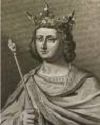



Philip IV's son Louis X the Quarrelsome (1289-1316) didn't last two years, popping a gasket after a ball game, and his newborn son John (Jean) I the Posthumous (1316) lasted five days, causing his brother Philip (Philippe) V (the Tall) (1294-1322) to be given the crown over Louis X's infant daughter because the infamous French Salic Law prohibited femmes from inheriting the throne of le roi. Tall or not, he only lasted 6 years, and his brother Charles IV the Fair (1294-1328) another 6 years, and after 3 strikes in a row (dying without a male heir, the Salic Law making and then breaking them), the Capetians became kaput.




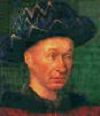
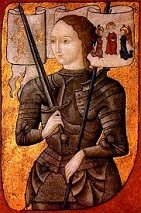
After Charles IV the Fair died leaving only a daughter and no Capetian bro's, Count Philip of Valois, son of Philip IV's brother was elected by the barons as Philip (Philippe) VI (1293-1350), founding the Valois Dynasty (until 1589), and getting France into the Hundred Years' War with England in 1337, which lasted that long because ten years later Europe was hit with the Black Death, cleaning its clock. In 1350 he was succeeded by John (Jean) II the Good (le Bon) (1319-64), who was succeeded in 1364 by Charles V the Wise (1338-80), then in 1380 by Charles VI the Mad (Beloved) (1368-1422) (who thought he was made of glass and was about to break), who lost the Battle of Agincourt in 1415 to the English, promising Henry V of England that he will be his successor, then lucking out when Henry died of dysentery in 1421 before he did, leaving his 5th son (the others didn't make it) Charles the dauphin to try to get what's his. Too bad, Charles nearly lost France to the English, until God intervened and gave a Mission: Impossible to smells-like-the-real-thing Joan of Arc (1412-31), after which he was crowned Charles VII the Victorious (1403-61), then turned around and cut her loose to the English to be burned as a witch for wearing men's clothing and leading troops into combat better than he could. Since women's lib was not even a movement back then, this treachery didn't doom the Valois Dynasty, rather, it prospered, and the Church later retroactively declared Joan a saint, making everybody happy, Vive la France. Charles then finally earned his own title of Victorious by going on to finally kick the English out of France and end the Hundred Years' War (begun 1337) in 1453 after 116 years (these are the Middle Ages, when calculator chips were in short supply).
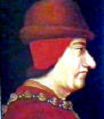




In 1461 Louis XI the Spider (1423-83) became king, followed in 1483 by his son Charles VIII (1470-98), who died in 1498 after hitting his head on a door in Amboise, leaving no heirs, after which his father's second cousin the Duke of Orleans became Louis XII (1462-1515), later (1514) marrying English king Henry VIII's younger sister Mary Tudor (1496-1533) (not Queen Mary I of England, that was Henry VIII's daughter), which made sense because his poet-prince daddy Charles of Orleans (1394-1465) (the Duke of Orleans in Shakespeare's "Henry V") spent 25 years in captivity in England after the Battle of Agincourt. Half-medieval and half-Renaissance, his rule was so mild that he became known as "the Father of the People" (Le Pere du Peuple), lalala la la la, lalala la la la.



On Jan. 1, 1515 king (since Apr. 7, 1498) Louis XII (b. 1462) dies, and Francis (Francois) I (1494-1547), son of his first cousin Charles d'Angouleme (1459-96) became French Valois king #9 (until Mar. 31, 1547), the first French Renaissance monarch, and "the father of France's devotion to culture", reigning at the same time as Henry VIII of England, and having to cope with the 1517 Protestant Revolution of Martin Luther too, but not copping out his religion over pretty petticoats like horny I'm Henry the Eighth I Am, staying loyal to the security cams of the Roman Catholic cause; too bad, he fell out with Holy Roman Emperor Charles V, getting in ? wars with him for 38 years (1521-59); his favorite residence is the Palace of Fontainebleau 35 mi. SE of Paris on 200 acres in the 42K-acre Fontainebleau Forest, where he assembles the Fontainebleau School in the 1530s to decorate it; his well-educated brain babe sister Marguerite d'Angouleme (1492-1549) sets up a salon that becomes known as the "New Parnassus", fostering Francois Rabelais (1494-1553), Clement Marot (1496-1544), Pierre de Ronsard (1524-85) et al; Francis I signs an alliance with 15-y.-o. Archduke Charles of Hapsburg (Austria) (1500-58) (future HRE Charles V), who becomes gov. of the 17 provinces of the Netherlands; on Mar. 24 Francis I makes his friend and cousin Count Charles III de Montpensier and de Bourbon, Duke of Chatellerault (1490-1527) the (youngest ever?) constable of France (until 1523); Francis I hires German Landsknecht mercenaries,and makes a brilliant crossing of the supposedly impassable Alps, followed by a brilliant military V on Sept. 13-14 over the Swiss and Venetians at the Battle of Marignano, where the superiority of artillery and cavalry over the supposedly superior Swiss infantry tactics is proven, then a few days later defeats Swiss mercenaries and seizes the Italian duchy of Milan, becoming its gov. (until 1519); after conquering Lombardy, the French make peace with the Swiss on Nov. 12 and with Pope Leo X on Dec. 14; the Swiss retain most of the Alpine passes plus a French subsidy in return for the right of the French to enlist mercenaries; Francis I becomes the first French king to appoint port-chaise-d'affaires (royal porta-potty attendants).





In 1547 Francis I's son Henri II (1519-59) became Valois king #10, bringing a new factor into the French Salic Equation, Italian commoner Catherine de' Medici (1519-89), niece of Pope Clement VII and daughter of Lorenzo de' Medici, duke of Urbino (to whom Machiavelli dedicated "The Prince"). By him she had three weak sons that she dominated, officially letting them be le roi while she actually ruled with her face that could launch a thousand ships, since it resembled a plank of wood: Francis (Francois) II (1543-60) (1559-60), Charles IX (1550-74) (1560-74), and Henri III (1551-89) (1574-89). Too bad, Catherine de' Medici stunk herself up with the St. Bartholomew's Day Massacre of French Protestant Huguenots on Aug. 24, 1572, dooming the Valois Dynasty.





In 1589 after Henri III was assassinated by a Jesuit intrigue, Protestant Henry of Navarre was crowned Henry IV (1533-1610), founding the Bourbon Dynasty (ends 1848), the last royal dynasty before France got U.S. fever and went republican, starting a wild roller-coaster ride caused by the entrenched priest-backed aristocracy and the closeness of anti-republican forces in Europe. Henry IV brought another Medici in as queen, Marie de' Medici (1575-1642), who wasn't Catherine de' Medici's daughter but was of the same say-hello-to-bedlam pedigree. In 1593 Henry IV ended 37 years of Catholic-Protestant religious civil war by converting to Roman Catholic, issuing the famous soundbyte "Paris is worth a Mass", and in 1598 he satisfied the other side by issuing the Edict of Nantes, granting religious toleration to all, thereby making all the bloodshed over the issue irrelevant dust, on paper. Too bad, in 1610 he too was assassinated by a Jesuit intrigue, and his 9-y.-o. son Louis XIII (1601-43) succeeded him as Bourbon king #2 of France under the regency of his Huguenot-hating mother Marie de' Medici, and it's deja vu in Medici, er, Bourbon France as she took charge until he finally got the nerve to throw her off in 1617, only to become the puppet of even worse Cardinal Richelieu (1585-1642), who used Father Joseph (1577-1638) as his éminence grise (gray eminence), while he lorded it like a pimp as the éminence rouge for the rest of his life, busily scheming to win the horrible unwinnable Catholic-Protestant 30 Years' War of 1618-48, which ended after the deaths of both him and Louis XIII in a push, and resulted in the Treaty of Westphalia, which gave each Euro monarch the right to decide his subjects' religion for them.

With Cardinal Richelieu out of the way, it came as no surprise that his puppet Louis XIII died soon after, leaving his infant son the throne. With the wars of religion past him, he grew up to become known as "the Sun King" Louis XIV (1638-1715), reigning 72 years (54 personally) while living the life of the rich and famous in an increasingly enlightened era marked by the glorious rise of Science, all dependent on royal patronage, reaching new heights of what absolute monarchs can get away with while making France #1 and its culture #1.

In 1715 his young son Louis XV the Well-Beloved (1710-74) inherited his daddy's stable kingdom, then wasted a lot it with a war with England over America, plus other worthless wars, allowing England to kick them out of America, after which the Yankees got ideas and kicked the English rulers out too, setting up the yummy yummy United States of America.


In 1774 Louis XVI (1754-93) and his Austrian wife Marie Antoinette (1755-93) started out well, but after the hunt-loving farmer-mentality king made the mistake of supporting the American Revolution, and his alien and flashy wife said the wrong thing too many times, it backfired as his own people decided to copy the Yanks, and they both ended up guillotined on Green Queen.

The French Revolutionary Period was ruled successively by the National Assembly, National Convention, Diretory, Consulate, and the French 1st Republic, under Corsican-born Napoleon I Bonaparte (1769-1821) (until 1814), who had dreams of being the next Julius Caesar, and almost pulled it off, building a mighty military machine and crowning himself emperor in 1804, only to throw it all away with his disastrous overreaching invasion of Mother Russia in 1812, after which he waterlooed out of history by 1815, leaving the country up for grabs.


On July 8, 1815 as Napoleon was shipped off to remote St. Helena Island to croak, Louis XVIII (1755-1824) was crowned in an effort to keep the Bourbon Dynasty going like nothing had happened for the past 25 years, except that the Charter of 1814 changed the French monarchy from absolutist to constitutional. On Sept. 26, 1824 after he became the last French monarch to die while reigning, his brother Charles X (1757-1836) succeeded, but made the mistake of trying to restore the old aristocracy with all its repression, causing another republican revolution, the July Revolution of July 26-29, 1830.

After the abdication of Charles X, I've-always-been-nice-to-you-guys Louis-Philippe I, Duke of Orleans (1773-1850) (AKA Philippe Egalite) was proclaimed the "citizen king of the French", ending the Bourbon Dynasty and beginning the Orleans Dynasty, but after promising more than he could deliver and growing more conservative and monarchical, he ended up facing the February Revolution of 1848 (Feb. 22-Dec. 2, 1848) and fleeing to England.



In 1848 after Louis-Philippe flew the coup, the French Second Republic (1848-52) was founded, with Napoleon I's nephew Charles Louis Napoleon Bonaparte (1808-73) elected president. Too bad, imperial ambition ran in the family, and in 1851 he proclaimed himself Emperor Napoleon III, uttering the soundbyte "L'empire, c'est la paix" (The art of empire is peace). Meanwhile Otto von Bismarck (1815-98) of Prussia began plotting to make Germany #1 in Europe, and with nothing but a whimpy Napoleon Divided by Three standing in his way, Prussia's future was so bright it needed to wear shades while firing its needle guns at every Austrian that moved.

In 1870 after taking care of Austria, the Germans overran France and kicked French butt bigtime, founding the German Empire, and causing the French 3rd Republic (1870-1940) to be founded in the ruins, with Leon Gambetta (1838-82) as the first president. From now on the once-mighty French army were creampuffs at the mercy of the next boot-in-the-nuts German invasion, and what's more, know it. How screwed-up their minds must be, knowing they blew their One Big Chance with Napoleon, and now are becoming irrelevant to history, no wonder they became Existentialists.

Pushing the fast forward button, Georges Clemenceau (1841-1929) became president of France in 1906-9 and 1917-20, watching it get its butt whipped by the Germans again until the Yankees invaded and saved it, ending nasty WWI and starting the tricky on-again-off-again French-American love-hate relationship. This time they built the Maginot Line to make them feel less squeamish about German invasion, but forgot to cover the Ardennes Forest or build up their tank army to cover possible end-around runs - it's an art class, we need to see your naked form?

When the Nazis came blitzkrieging into France in 1940, they set up the puppet French Vichy Government (1940-44), headed by WWI-#1-hero-turned-traitor Marshal Henri-Philippe Petain (1856-1951).
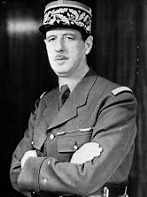
After the Yankees came to the rescue again with the D-Day Invasion of June 6, 1944, followed by the liberation of Paris on Aug. 24, the Allies set up the French Provisional Govt. (1944-6), headed by Charles de Gaulle (1890-70). After that French history was overshadowed by the giant U.S. and Soviet Union and their Cold War. The once strongly religious Roman Catholic population became anti-religious, the churches became empty except for old folks, being French started to feel like being a dinosaur in the world of mammals, the thinkers retreated into Existentialism, and after the U.S. exploded its first A-bomb, a Frenchie invented the bikini to get even with the Yankee Puritans. After the U.S. went through its own catharsis over 500 years of white supremacy, taking Europe with it, the 21st century arrived, but after the equality movement went too far and made it virtually non-PC to bring up a little thing like 1400 years of history when it comes to them, Muslim "refugees" began flooding into France, Belgium, and the rest of Europe, treating their new digs like a lease-to-buy option and setting up horrible Medieval Sharia law wherever they could get away with it, bringing us to the present deja vu where everybody's changed but them, I always feel sad and hopeless. "How maddening, says God, it will be when there are no longer any Frenchmen" - Charles Peguy (1873-1914).
Welcome to the old new world.





